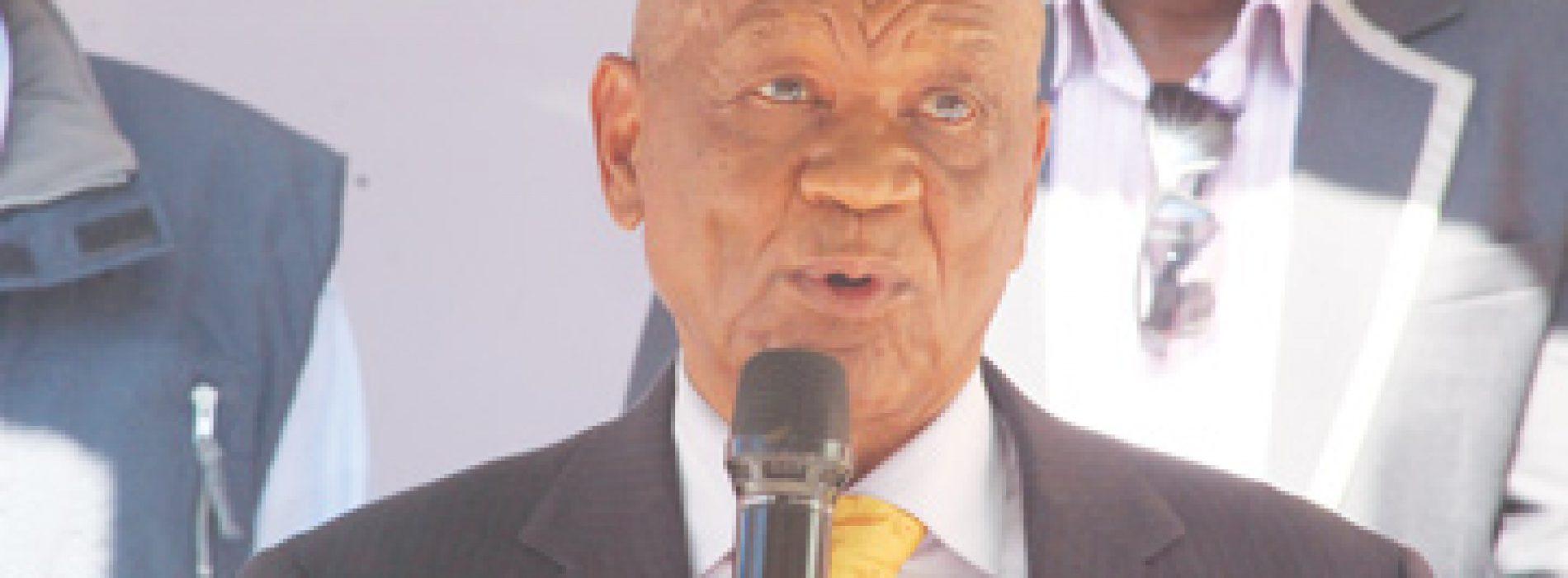Africa-Press – Lesotho. Continued from last week
3.4.3. Reforms Relating to the Justice Sector
3.4.3.1. Context and rationale
The rule of law is a necessary precondition for a well-functioning government, national stability and accelerating sustainable development.
Within the framework of the justice reform policy and strategy, efforts to improve the administration of justice in Lesotho has included High Court circuit hearings, legal aid provision, introduction of mediation and establishing a case management system.
From 2010, Lesotho embarked on civil justice reforms to establish a well-performing commercial court to quickly resolve cases using well established rules and procedures, and this has enhanced the business and investment environment. Additionally, there have been public outreach programs, increased access to legal information, and training conducted to improve staff skills.
Inadequate provisions for judicial independence and other structural and systemic deficiencies in the justice system combined with cyclical political instability has undermined the rule of law and denied people in Lesotho from having equal access to justice.
The steps needed to ensure the independence of the judiciary and other institutions are articulated in the section on Political Stability and Constitutional Arrangements above. The reform of laws experiences excessive process delays.
Most justice institutions are centralized in the capital Maseru and some urban centres; and they suffer from capacity constraints due to lack of basic infrastructure and material resources, shortage of staff and insufficient budgets to address the high caseload.
Similarly, the state run legal aid scheme also based in Maseru is unable to provide services to all who need it. Moreover, the Directorate of Public Prosecutions (DPP) and Police lack sufficient skills, capacities and tools necessary to effectively investigate and prosecute cases particularly in emerging and complex areas.
The net result is a slow throughput of cases, long trials and a high case backlog in a system already constrained by weak case management and poor sector wide coordination, communication and cooperation. The prisons are overcrowded with over 5,000 inmates of whom approximately 25 percent are pretrial detainees awaiting trial.
The excessive use of incarceration of suspects who could safely await trial in their homes has placed undue pressure on the budget of the Correctional Services to cater for detainees who go on to experience harsh socio-economic effects that often last long after their detention.
Furthermore, the commercial justice reforms have slowed while there is limited attention paid to other civil justice reforms. The fact that no single criminal justice institution takes responsibility for this state of affairs provides the basis for a thorough sector-wide review to address the deficiencies in the system.
Public perception and confidence in the justice system is currently low. Coupled with low levels of public knowledge about their rights, the costly legal services and long distances to access services, most Basotho especially in the rural areas opt instead to rely on the lay-manned Central and Local Courts, and traditional justice that is delivered through Chiefs.
While these mechanisms offer an accessible, affordable and efficient means of resolving disputes, they often fail to follow due process or comply with human rights standards, thus undermining the quality of justice they dispense.
The key challenges in the justice sector are well known; but there is no evidence of the scale of the problem. Neither have the views of the Basotho been canvassed in defining these challenges or used to determine their justice needs.
Moreover, the challenges are viewed largely from an institutional, rather than from a system wide perspective — an approach that is not efficient for yielding positive impact across the justice chain when resources are inadequate to address major and complex challenges.
Complementary efforts to systematically domesticate, implement and fulfil Lesotho’s human rights obligation has not yet led to a culture of human rights respect, despite the ratification of core international human rights treaties.
Lesotho does not yet have the means to establish and sustain a legislative, policy and regulatory framework that fully complies with human rights standards and which are conducive also to peacebuilding and national development.
Compared to civil and political rights, inadequate attention is being paid to socio-economic rights including in the Constitution where they are expressed as directive principles of state policy and not included in the main text of the Bill of Rights.
Additionally, the national human rights system in Lesotho remains weak in the absence of a National Human Rights Commission (NHRC). The Office of the Ombudsman which has a broad-based mandate including human rights, is financially constrained, short-staffed and unable to effectively perform all its functions.
Several promotion and monitoring activities are carried out by the Human Rights Unit (HRU) of the Ministry of Law and Constitutional Affairs which does not have a mandate to investigate and provide redress to complaints of human rights violations.
The delays in operationalising the NHRC has therefore left a gap in the legal protection of human rights, limiting the impact of work especially at the community level where there is little or no outreach.
Noting the similarity in their functions, the HRU, the Ombudsman and the NHRC, runs the risk of duplication and inefficient, ineffective and inequitable delivery of services and information in a manner that does not improve the human rights of Basotho.
Functioning as the secretariat for treaty body reporting and the Universal Periodic Review (UPR), the HRU has been able to carry out several promotional activities, prepare and submit treaty reports to different Treaty Bodies despite being understaffed and underfunded.
In 2010 and 2015, the GoL also submitted on time its UPR Report on the state of human rights in the country to the Human Rights Council. The HRU however faced challenges in coordinating government ministries, departments and agencies who do not have a shared understanding of their reporting roles.
The absence of a clear process and inadequate capacity of technical staff within other ministries to collate information and prepare human rights oriented reports coupled with lack of available data to draw from has led to a high number of residual reports that are overdue, some dating as far back as 2002 or 2001.
Moreover, there is no systematized way for follow up action on ensuing recommendations from these mechanisms. The national reform agenda provides a timely opportunity for the justice actors to renew their commitment to address these challenges.
3.4.3.2.
Objectives
a) To develop a holistic sector-wide reform framework for strengthening the rule of law, justice and human rights
b) To implement innovative strategies to increase equal access to justice for all especially marginalised and vulnerable groups
c) To facilitate the identification of and consensus on issues relating to the rule of law, justice and human rights for consideration through the constitutional making/review process.
d) To mainstream human rights standards and principles within the national reform and development processes. e) To consolidate past gains and expand justice and legal empowerment reforms
3.4.3.3.
Key reform actions and processes
In order to achieve these objectives, it is envisaged that the justice sector will immediately organize itself to engage in the national reform process by building in-sector consensus on the needed reforms.
Having already identified some areas for reforms, the sector will concurrently implement them in the short to medium term. In the longer term, the sector will collectively and as individual institutions, engage in and propose rule of law, justice and human rights issues for consideration in the constitutional review process.
Throughout these efforts, the sector will ensure that linkages are made with other reform areas, in particular, the security sector and public service.
Furthermore, in the long term, the sector will take steps to evaluate the impact of implemented reforms, review and revise the reform strategy with a view to consolidating past gains while responding to emerging issues and expanding the reforms.
To this end, the roadmap recommends the following actions under three phases:
• Short Term:
In order to build national consensus on justice reform areas and priorities aimed at increasing equal access to justice for all, particularly for the poor and marginalized groups, the justice sector will:
Set up a two-tier decision-making structure (a sector-wide coordinating mechanism, and institution-specific mechanisms) to prepare and submit a unified or coordinated position in the national reform process;
Work through the above structure, to develop an evidence based national justice policy and revised reform strategy to which institutions will align their respective Strategic Plans.
These instruments will collectively guide the implementation of future reforms in an integrated way. Develop a framework/guidance to anchor the national reform process on human rights and ensure its standards and principles (e. g.
equality and non-discrimination, participation) are mainstreamed;
• Medium Term:
By building on past decisions and actions, the justice sector will continue to implement short to medium term reforms, which include:
Developing a national human rights policy and a National Human Rights Action Plan in a consultative and participatory way;
Strengthening the capacity of justice institutions to become effective, accountable and inclusive. Making linkages with public sector reforms on performance management will be key.
Implementing plans to decentralize justice related services in a rationalized way, complemented by implementation of an efficiency saving strategy within all institutions that should also be developed;
Identifying and implementing measures to reduce the high case backlog, length of pre-trial detention and prison congestion;
Establishing a fast track mechanism and processes to revise, reform and enact new priority laws;
Increasing and expanding implementation of civil justice reforms that have not given due attention compared to criminal justice reforms;
Strengthening Lesotho’s reporting obligation to international/regional human rights mechanisms to reduce the backlog of residual reports and ensure that upcoming reports are submitted timely;
Operationalising the NHRC within a strong national human rights system to be able to effectively promote and protect human rights
• Long-Term:
Using inclusive and participatory approaches, the justice sector will facilitate sector and institution specific dialogues and consensus on issues related to the rule of law, justice and human rights for consideration during the constitutional review process.
It will result in consolidated justice sector and institution specific Technical Notes that will be submitted to the constitution review structures. Additionally, the sector will evaluate implemented reforms and use the findings to revise the reform strategy with a view to consolidating past gains and addressing emerging areas of concern.
3.4.4.
Reforms Relating to the Public Service
3.4.4.1. Context and rationale
Evidence within and outside Africa has demonstrated that civil service excellence can be a driver of national transformation through the diligent implementation of socio-economic development plans and service delivery.
Like in any successful enterprise, civil service excellence is founded, among other things, on professionalism, efficiency, dedication to service and a results orientation.
In this age of information and exponential technological advancements, a modern civil service must be in tune with innovations that improve management and service delivery.
Lesotho’s civil service must re-invent its approach to service and to propel the country beyond the multiple socio-economic challenges that confront Basotho.
Currently, Lesotho has one of the highest wage bills in sub-Saharan Africa. Public service salaries, wages and capital expenditures are about 80% of Lesotho’s total revenue collection.
While revenue has more or less stagnated, there have been steady increases in government employees and in salaries per employee, leaving the government to become the leading employer ahead of the private sector.
Human and institutional capacity limitations are significant factors in poor service delivery and gaps across Ministries, Departments and Agencies (MDAs).
The current situation calls for changes to create an efficient, motivated, results-driven and productive public service. The structure of our public service is bottom-heavy, with a large pool of support staff against a small number of professional staff.
At the same time, our public service is perceived as polarized, politicized and nepotistic. The current situation calls for a radical shift. Change is inevitable. Various public service reforms have been mooted and tried before but failed because of poor implementation strategies.
For example, the Public Sector Improvement and Reform Programme (PSIRP) launched in 2001-2002 had little impact on service delivery due to a lack of enthusiasm for change, and monitoring and evaluation plans. These previous reform initiatives may also have suffered for lack of strategic leadership and champions.
These lessons will inform the renewed efforts for public service reforms.
3.4.4.2 Overall Objective of Public Service Reforms
The overall objective of the proposed public service reforms in Lesotho is the creation, and retention of an effective, motivated, professional, innovative, results-oriented and people-focused public service which is aligned to the country’s developmental aspirations.
To achieve this objective, the proposed changes will be pursued and implemented according to the short term, medium term and long-term specific objectives below.
Specific Objectives
• Short-Term
Objective 1: Strategic administrative changes to increase transparency and public confidence in the public service
There are number of administrative reforms that do not require new legislation or Constitutional changes.
These administrative changes will be jointly identified with stakeholders – but include:
Review and strengthen the Public Service Commission so that it is an autonomous and can perform its duties diligently with minimized influence.
Conduct special designed Leadership training course including change management skills for leaders and managers in Public Service to strengthen capacities and make them effective change managers/agents
Strengthen the leadership and monitoring functions of the Office of the Government Secretary and that of the Director-General for better performance in overseeing, coordinating and monitoring all reforms implementations.
Use technology to be more innovative in disseminating information, i. e. Enhance publication of more GOL documents – e. g. Strategic and Sector plans, reform programmes, procurement notices.
Have and implement clear Service Charters: All MDAs have Service Charters developed and in place. They should immediately display “Service Charters” on their respective notice boards and implement accordingly. Likewise, each MDA will endeavour to educate the public, through media mainly radios and TVs, and other fora on what services they provide and how.
Conduct feasibility study for the establishment of an independently-managed government training institute or outsourcing arrangements – including examination of Lesotho Institute of Public Administration and Management’s (LIPAM) role and significance in addressing training challenges and if it can be transformed to a school of government. Further develop and implement the concept of One-Stop Service Centres.
• Medium-Term
Objective 2: Develop a holistic plan for the Creation of a professional results-oriented public service for improved service delivery and development
Under this objective, the Reforms Task Force at the Ministry of Public Service will ensure, in inclusive consultations, in the development and implementation of a comprehensive reforms plan for the Public Service to implement in the medium term including:
Review, agree, and implement better selection and appointment procedures into leadership positions,
Improve leadership and management competencies at managerial levels to make it effective, professional and results oriented through training and retraining,
Adopt and institutionalize contractual Performance Management System with senior managers and Organizational Performance Management System in Public Service to hold leaders accountable.
Adopt and implement best practices (adhering to Code of Conduct and Ethics, Attitude and change management, rewards and sanctions) to promote accountability, transparency and ethics in public service.
Strengthen management systems by implementing sector strategies,
Develop a public service competency framework and create a system-wide audit of skills and competencies to aid targeted training and/ or recruitment
Review and improve Public Service Training Policy and include self-learning procedures,
Enhance Information Communication Technology across public service.
Objective 3: To improve terms and conditions of public service in order to retain professional public servants
The public service is characterized by poor human resource management practices such as ineffective recruitment systems, lack of succession planning and career progression, distorted and inconsistent compensation structures, lack of effective performance appraisal and the associated rewards and sanctions; high vacancy rates in some establishments while there is over establishment in others, and serious skill and competence gaps across the public service.
There is a general absence of computer literacy and low use of ICT in service and in human resource management. There is poor working environment, low staff morale and poor work ethics and low productivity.
A Holistic Reforms Plan for Public Service should have some commitments concerning the following to implement in Medium to long term:
To attract, develop and retain brilliant individuals in public service.
Enhance the recruitment processes to make them shorter and effective,
Improve human resource forecasting system in the Public Service, define clear succession plans, career progression so that public servants may be encouraged to stay in service.
Improve and update jobs description at all levels,
Improve public service remunerations
Revise Human Resource Management systems and procedures. Continuously conduct Leadership and Management competence assessment for senior GoL positions including all positions so that we can place the right people in the right positions across MDAs.
Streamline HR management functions in the public service,
Develop and adopt Communication Strategy,
Improve Terms and Conditions of Service,
Review and adopt a better Pension system that when people retire, can go home happily after many years of service.
Long-Term
Objective 4: To review laws and regulations in order to clarify mandates and roles to improve institutional functions
The intention under this objective is to undergird reforms through reviewing laws and regulations that govern MDAs and the public service itself.
The Holistic Reforms Plan for Public Service should have some commitments to review outdated laws and conflicting institutional mandates that compromise the leadership and management in MDAs and to be implemented in the long term.
Among many others:
Employees of Parliament and Judiciary are recruited by Public Service Commission. Review this situation to reduce the work load of the Public Service Commission and separate Powers of the three branches of Government to create their full independence. Strengthen the Auditor General’s office by reviewing relevant laws and regulations.
Likewise, carry out inclusive consultations to review the operating systems and policies governing Public Service for effectiveness,
Develop and adopt better policies and systems that are inclusive and evidence- based,
Consult all stakeholders and agree, develop and adopt standardized and transparent Human Resource Systems across the Public Service,
Review, restructure and align structures of MDAs to remove overlapping and conflicting mandates (for example that between the central government and local authorities.
)
Ministries and organisational units should have clearly defined roles, responsibilities and working relationships.
3.5.
National Dialogue on the Lesotho we Want
3.5.1 Context and Rationale The nature of the reforms and transformation envisioned for our Kingdom cannot succeed without an open, honest and inclusive dialogue among all Basotho in a way that could address concerns for national unity and reconciliation.
We need to undertake a process through which, together, we can define the Lesotho we Want and how the reforms can contribute to that future. Through its Summit Decisions, SADC, mandated its Facilitator for Lesotho, H.
E. Deputy President of South Africa Cyril Ramaphosa, to spearhead a national dialogue on the reforms immediately after the election. The Prime Minister Dr.
Motsoahae Thomas Thabane has severally affirmed the commitment to the national dialogue to facilitate the reforms. We, as a government, appreciate the centrality of inclusion of all key stakeholders in the dialogue process.
We fully appreciate that undertaking reforms in the absence of representatives of a large segment of our population would be inconsistent with our stated goal of a fully inclusive reform process and national reconciliation.
It is in this regard that the government is engaging all political leaders to ensure everyone’s participation and contribution in the reform process. Our well-established tradition demands that every Mosotho must be heard.
Indeed, we have a saying that ‘BOHLALE HA BO AHE NTLOANA NGOE’: wisdom does not reside in one household or individual. The proposed Multi-Stakeholder National Dialogue (MSND) recognizes the need for an inclusive and consultative process that is representative of all Basotho.
We must developa with home-grown solutions to promote our unity and reconciliation. Lesotho has a rich tradition of dialogue and consensus building, and a legendary connection to the concept and practice of peace.
The Great Founder of our nation, King Moshoeshoe I, built Lesotho on a foundation of consensus, peace and diplomacy among Basotho and between Basotho and their neighbours.
We must not let him down! Our traditional form of consultation and consensus building is the pitso. In modern times, the pitso has been used as an instrument for government to communicate with its people and for the people to express their views to government.
The pitso format allows for open dialogue in which people freely speak their minds in order to reach a consensus. All Basotho are stakeholders in the national dialogue about the future of their country.
In this regard, we are grateful for the contribution of Lesotho’s civil society who in October 2017 organised the “Post-Election National Dialogue – Reforms, Rule of Law and Nation Building.
” This civil society-led dialogue fits into our well-established tradition of open exchange.
As we work towards the MSND, we recognize the role of civil society and our religious leaders and will work closely with them in the design and facilitation of the dialogue.
3.5.2 Objectives and Proposed Process
The government proposes to facilitate a Multi-Stakeholder National Dialogue (MSND) on the Lesotho we Want with two main objectives:
To consult on issues affecting the peace and stability of Lesotho and build consensus on how these could be addressed through the national reforms agenda;
To forge a way forward for national unity, healing and reconciliation.
To facilitate these objectives, the MSND will give an opportunity to Basotho to articulate their views on the reforms and how greater unity and reconciliation could be cemented towards the Lesotho we want.
The principles of inclusiveness, transparency, equity, participation, accountability, democratic rules and procedures, and consensus building, will guide the dialogue. Through the MSND, we intend to go beyond simply throwing words at each other.
We want to have real honest interactions among ourselves – one Mosotho looking the other in the face, and agreeing to accommodate each other for the betterment of the whole nation.
In doing this, we will often need to ask tough questions that may require uncomfortable answers. The dialogue platform provides us with an opportunity to do this without offence. A Concept Note outlining the design of the MSND is annexed to this document.
In broad strokes, however, the GoL proposes the following structure and process:
• A National Leaders Forum, primarily involving political leaders, to forge a political consensus on the reforms and national reconciliation.
As agreed by the leaders, this Forum could meet at intervals as needed during the implementation of the reforms;
A MSND on the Lesotho we Want consisting of the following:
An Inaugural Session (National Plenary 1 – NP1) of the MSND to formally launch the national dialogue.
The details of this inaugural conversation will be developed in a consultative way. The GoL’s suggestion is that NP1 should help in defining the issues requiring dialogue; give direction on the cascading of the dialogue to the districts; and how these consultations will be facilitated and the contributions harnessed.
In-district consultations to be facilitated by civil society partners or as agreed based on questions and procedures agreed in NP1. National Plenary 2 (NP2) which will receive feedback from the districts, draw conclusions of the national dialogue, and agree on the way forward to implement its recommendations.
To start off the process, the GoL will facilitate the composition of a National Dialogue Planning Committee (NDPC) inclusive of stakeholders. Once the process is agreed, and all preparations are in place, the Prime Minister will announce to the nation on the commencement date of the national dialogue and the reform process.
At the National Plenary I, the Government will present its reforms proposal including a detailed Roadmap and seek the plenary’s feedback.
3.6 CROSS SECTORAL LINKAGES AND SEQUENCING
The proposed Reforms Framework recognizes that the targeted institutions and sectors function as a part of system.
A sector and institutional approach to the reforms facilitates ease of management and may even encourage a healthy competition for excellence among the individual entities; however, reforming one area in isolation would not produce the desired effects.
The examples listed here are not exhaustive:
In terms of checks and balances, the oversight role of parliament over the Executive and the security agencies will require changes such as enhanced independence and capacity of Parliament through its portfolio committees;
Strengthening Parliament oversight will enhance the idea of the civilian control of the security forces;
Enhancing the independence of the judiciary to enable it better to protect democracy and the rule of law; ensuring professionalism and dedication by all public servants including those in the security forces duty; will be linked to the broader entrenchment of results-oriented, motivated and professional public service.
At the same time, the judiciary cannot deliver on justice and human rights in the absence of an efficient investigative, prosecutorial, correctional and other services.
Sector-wide reform and capacity building will be necessary. In order to demand and enjoy their rights and services, people require to be educated and informed about their rights. Public information and dialogue will be indispensable.
Appointment mechanism for senior public service officials affects all the sectors, hence the Constitutional reforms will require inputs from all the sectoral groups to finalize possible amendments.
The pursuit of civil service excellence and a culture of results-orientation will have far-reaching effects on all arms of government including parliament, the judiciary and the security agencies.
The framework is also premised on the idea that beginning with urgent legislative, policy and administrative measures would consolidate stability in the identified sectors, build confidence and create momentum for the longer-term reforms and constitutional review.
Sequentially, this approach allows fundamental root issues in each institution or sector to be filtered upwards and, as necessary, be referred to longer-term reforms or to the constitutional review process.
4.
IMMEDIATE STEPS TO INITIATE THE NATIONAL DIALOGUE AND THE REFORMS
The journey of national transformation proposed in this document is no doubt ambitious, but one on which we must embark. As the saying goes, the journey of a thousand miles starts with a single step.
As a starting point, the GoL proposes the following immediate steps to initiate the national dialogue and the reforms.
4.1 Build trust and confidence among political and other leaders to create an enabling environment for the national dialogue and the reforms: The national dialogue and reforms envisaged for the country will require the participation, contribution, dedication and goodwill of every Mosotho.
These cannot be achieved in an environment of mistrust, anger, fear or suspicion. Rather, Lesotho’s leaders across the political divide must work together to create a conducive environment for the national dialogue and reforms.
The proposed National Leaders Forum is intended to support the trust and confidence building process. Initial steps have already been taken, in conjunction with SADC, to contact political leaders outside of Lesotho’s borders. These efforts will be continued in earnest.
4.2.
Establish an Inclusive Committee to Plan the three-tier National Dialogue: The Government will facilitate the formation of the National Dialogue Planning Committee (NDPC) to plan the MSND as outlined in the section on National Dialogue.
The NDPC will plan Plenaries I and II and facilitate the organisation of the In-district Consultations as will be agreed in Plenary I of the MSND.
4.3.
Facilitate the formation of a National Reforms Mechanism (NRM) as agreed at the end of Plenary II: As articulated in the Guiding Principles in this document and in The Coalition Agreement for National Unity, Reconciliation, Peace and Stability, the Government is committed to facilitating an inclusive and independent reform process.
The Government will therefore facilitate the formation and operationalisation of a National Reforms Mechanism as agreed at the end of Plenary II of the MSND.
4.4.
Create a Resource Basket for the national dialogue and reforms processes: The Government recognises that the reform agenda will require a substantial outlay of resources.
The reforms will also unfold alongside other day-to-day priorities of ensuring that Basotho have access to services. The Government will set aside its own resources for the reforms while at the same time seeking the support of its international partners.
4.5.
Develop and roll-out a communication strategy for the reform agenda and national dialogue: Every Mosotho and all Lesotho’s partners will need to be well informed about the national dialogue and the reforms. It will be critical for all stakeholders






